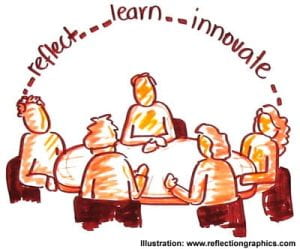written by Matt Andrews
Action learning is a key part of PDIA. It is “a hybrid technique that allows participants to use what they learn to tackle priority problems within their companies under actual work conditions. Action learning is a social process for resolving the difficulties managers increasingly confront, where history offers no solution.
At its heart, action learning is a systematic process that increases participants’ organizational learning in order to help them respond more effectively to change. Originated by Reg Revans (1983), action learning is based on the underlying premise that there is no learning without action and no action without learning. Action learning is inextricably linked with action science. Action science (Argyris, Putnam, and Smith, 1985) provides a conceptual framework and a methodology for facilitating action learning, while Revan’s work establishes the actual form. The following processes of action science are implicit in action learning:
- Critical reflection: bringing underlying assumptions to consciousness; testing those assumptions to determine if they are appropriate for attaining the desired goal
- Reframing: altering assumptions that don’t accomplish desired goals
- Unlearning and relearning: developing new sets of learned skills based on reframed assumptions; replacing old with new skills until new ones are automatic.
Action learning methodology has three main elements:
- Problems that people identify;
- People who accept responsibility for taking action on a particular issue; and
- Colleagues who support and challenge one another in the process of resolving the problems.
Using real tasks as the vehicle for learning, individuals, groups, or teams develop management and leadership skills while working on organizational problems and testing their assumptions against real consequences. By taking a real problem, analyzing it, and implementing solutions derived with colleagues, individuals monitor results and can be held accountable for their actions. Revans believes that if we are to cope with accelerating and turbulent change, then we must place our confidence in the lived experiences and insights of others in order to be successful.” from “Experiential Learning, Past and Present” Lewis, L.H. and Williams, C.J. (1994).
